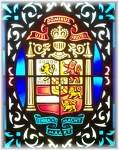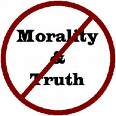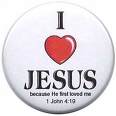Sunday, September 24, 2006
Friday, September 22, 2006
Denominations: Necessary, Biblical?
 My mother was from a Methodist family which was once a mix of Presbyterian and Roman Catholic. My father's family was supposed to be Lutheran, but ended up Roman Catholic. We moved two doors down from a Reformed Church in America congregation, and so I grew up in that denomination, even attending an RCA college and seminary. Only in America can one find such a common story of Heinz 57 religious pedigree. I looked in vain for any Jewish or Byzantine relatives, but did find to my horror a Dutch great-grandmother.
My mother was from a Methodist family which was once a mix of Presbyterian and Roman Catholic. My father's family was supposed to be Lutheran, but ended up Roman Catholic. We moved two doors down from a Reformed Church in America congregation, and so I grew up in that denomination, even attending an RCA college and seminary. Only in America can one find such a common story of Heinz 57 religious pedigree. I looked in vain for any Jewish or Byzantine relatives, but did find to my horror a Dutch great-grandmother.Being a member of a denomination since I was four, I have appreciated the common life, heritage, and networks which comprise the RCA as a part of the body of Christ. I like the name "Reformed," which evokes Calvinism, reformation from Rome, and the doctrines of grace. On the other hand, I have had a front-row seat to all which is wrong in my denomination, wrongs shared by most other mainline Christian churches. I have observed a speedy decline in doctrinal orthodoxy, coinciding with a rise in ecumenism, feminism, and a widespread rejection of biblical authority. Our two seminaries are rife with heretical professors, non-biblical/theological curiculla, and each year pump out more and more young pastors hostile to the historic Reformed faith as summarized in our creeds and confessions. The shadows are indeed lengthening, and our spiritual decline is matched only by our numerical decline, as God's people desire and seek out the pure milk and meat of the Word.
All of this has taken a toll on the spiritual health of individuals and congregations. Conformity, uniformity, and centralization of power in the RCA has left many wounded by the side of the road. When I was ordained, I thought I was leaving the corporate world for the sacred precincts of divine service, only to find the church lapping up every secular business trend it could find. I should have known something was amiss, when my final seminary class was taught by Max Dupree, a businessman and author. He told us to be efficient office managers. Now in my present classis, people are fussing about "Best Practices," and higher judicatories are implementing "Carver Governance Policy." I don't know a great deal about either, but I know enough to say they smell like smoke.
I have not yet mentioned the persecution of evangelicals in the seminaries, the difficulties of remaining composed at classis meetings, nor the misery of reading The Church Herald, which is a mouthpiece for the small, unelected cabal of liberals who control the denomination.
As my rhetoric grows more heated, one can sense that I am building to a position that denominations are not necessary. They are in fact mostly hindrances to ministry, false substitutes for the true church, engines of oppression and power, and without warrant in the Bible.
My admiration for John Owen is enormous, and his writings on the nature of the church have provided me both a great solace and a direct challenge to denominationalism. I hope to share some of what I have gleaned from Owen in my next post. I will leave you with Owen's definition of the church, which is taken from his Brief Instruction (1667):
"A society of persons called out of the world, or their natural worldly state, by the administration of the word and Spirit, unto the obedience of the faith, or the knowledge and worship of God in Christ, joined together in a holy band, or by a special agreement, for the exercise of the communion of saints, in due observation of all the ordinances of the gospel."
Tuesday, September 19, 2006
"Liberal Evangelicalism"
 I read this morning at The Christian Post, that liberal evangelicals are about to begin a campaign to move the church beyond debates about abortion and homosexuality. The following quote, however, belies the truth of this organization ~ it is fraudulently misnamed, and has no right to the name "evangelical." This new group, called Red Letter Christians...
I read this morning at The Christian Post, that liberal evangelicals are about to begin a campaign to move the church beyond debates about abortion and homosexuality. The following quote, however, belies the truth of this organization ~ it is fraudulently misnamed, and has no right to the name "evangelical." This new group, called Red Letter Christians..."announced plans to establish a grass-roots network of 7,000 moderate and progressive clergy members."
Two things stand out here. The first is the group's official name ~ Red Letter Christians. One must assume it refers to the Words in Red found in so many editions of the Bible, words which come from the mouth of Jesus Christ. This is a tired and predictable practice among liberal Christians. They are always putting the New Testament at odds with itself ~ setting Christ against Paul, and creating a "canon within a canon." For example, at a recent ordination exam, a student who was questioned about homosexuality said, "I stand with Jesus, who said nothing about the subject." Apart from the answer being egregiously wrong (Jesus uses the word porneia), it illustrates the hostility liberals have toward the whole counsel of God.
A second item of interest is that the true taxonomy of the organization is revealed in the use of the words "moderate" and "progressive." These are not hallmarks of evangelicalism, but is rather the smokey nomenclature of evangelicalism's enemies. For an evangelical is not moderate nor progressive. An evangelical is devoted to the "old paths" (Jeremiah 6:16), to "bringing every thought into captivity to the obedience of Christ" (2 Corinthians 10:5), and to trembling before God's Word (Isaiah 66:2).
 "Liberal evangelicalism" is an oxymoron, a contradiction in terms. To be an evangelical is to reject the philosophies of the secular world, and to rely solely upon the Bible, the "evangel" or good news found in God's infallible Word. The church must move the world, to echo G.K. Chesterton, not vice versa. When I begin to hear liberals speak of saving souls and rescuing the damned from the fires of hell, I will then cautiously embrace them as brethren. Until then, they remain, in my mind, a fifth column, traitors to the cause of Christ.
"Liberal evangelicalism" is an oxymoron, a contradiction in terms. To be an evangelical is to reject the philosophies of the secular world, and to rely solely upon the Bible, the "evangel" or good news found in God's infallible Word. The church must move the world, to echo G.K. Chesterton, not vice versa. When I begin to hear liberals speak of saving souls and rescuing the damned from the fires of hell, I will then cautiously embrace them as brethren. Until then, they remain, in my mind, a fifth column, traitors to the cause of Christ.Sunday, September 17, 2006
Friday, September 15, 2006
Deadly Idolatry
 No you haven't stumbled onto a naughty blog. The picture to the left is of a model, and it is also a picture of an idol ~ a very dangerous idol. In our day, Baal is forgotten, Zeus is a mere myth, and meat is offered nowhere to any strange deities (except, possibly, for feeding Michael Jackson). Our idols are, however, just has potent and just as powerful as those facing God's people in the Bible. These idols kill, make people miserable, and distract them away from spiritual truth and a living relationship with Jesus Christ. Let's look at two such idols, which I will name "Emaciatia" and "Fenway."
No you haven't stumbled onto a naughty blog. The picture to the left is of a model, and it is also a picture of an idol ~ a very dangerous idol. In our day, Baal is forgotten, Zeus is a mere myth, and meat is offered nowhere to any strange deities (except, possibly, for feeding Michael Jackson). Our idols are, however, just has potent and just as powerful as those facing God's people in the Bible. These idols kill, make people miserable, and distract them away from spiritual truth and a living relationship with Jesus Christ. Let's look at two such idols, which I will name "Emaciatia" and "Fenway.""Emaciata" is the goddess of fashion and body image. She insists all women look like the women in the photo, which is to say emaciated. Is the woman in the photo beautiful? To some perhaps, but to me she looks like she just spent time in either a concentration camp or an East African food cooperative. She looks like a sexless broom. The problem is that literally hundreds of millions of girls and women hold this up as an ideal, an idol to emulate and worship as the symbol of beauty. Do you know what the symbol for female beauty was in the ancient world ~ chubby. Fat meant health. It meant you had something to eat. Every day women young and old are dying of eating disorders, or feel miserable about themselves because they don't look like "Emaciata." This affects women spiritually as well. Obsessing over weight, dieting, and starving themselves takes time away from worship and prayer. It is narcissism in the extreme. Jesus said, "Therefore I tell you, do not worry about your life, what you will eat or drink; or about your body, what you will wear" (Matthew 6:25). The idol of vanity is poison to a life in the Spirit, and the opposite of loving and caring for others (agape).
 Now I haven't forgotten the men. The idol I call "Fenway," is the obsession with sports. Soccer for the kids, followed by twenty hours on the couch watching college football, baseball, and the most powerful of the present false gods - the NFL. The reason I call this idol "Fenway" is because up until recently, the fans of the Boston Red Sox baseball team were known to suffer enormously over their team's feckless pursuit of a World Series championship. People even suffered emotional and psychological damage over the issue. Say the name "Buckner" to one such fan (short for fanatic), and it would induce a wave of despair. Such sport obsession has its physical and spiritual consequences. Men become obese, snacking for hours in front of the television. They ignore Sunday worship, and while they can repeat endless statistics to you, they couldn't find Deuteronomy with a map. In the immortal words of the dean of Faber College, "Fat, drunk, and stupid is no way to go through life." It is a replacement for God, and risks the spiritual peril of ignoring one's salvation.
Now I haven't forgotten the men. The idol I call "Fenway," is the obsession with sports. Soccer for the kids, followed by twenty hours on the couch watching college football, baseball, and the most powerful of the present false gods - the NFL. The reason I call this idol "Fenway" is because up until recently, the fans of the Boston Red Sox baseball team were known to suffer enormously over their team's feckless pursuit of a World Series championship. People even suffered emotional and psychological damage over the issue. Say the name "Buckner" to one such fan (short for fanatic), and it would induce a wave of despair. Such sport obsession has its physical and spiritual consequences. Men become obese, snacking for hours in front of the television. They ignore Sunday worship, and while they can repeat endless statistics to you, they couldn't find Deuteronomy with a map. In the immortal words of the dean of Faber College, "Fat, drunk, and stupid is no way to go through life." It is a replacement for God, and risks the spiritual peril of ignoring one's salvation.The Apostle John ends his first epistle with this warning: "Dear children, keep yourselves from idols."
Monday, September 11, 2006
Five Years Later
 Five years ago today I was sitting on my couch waiting to be driven to the Cancer Institute of New Jersey, in New Brunswick. Six weeks earlier I had been released from the Robert Wood Johnson University Hospital, having completed the intensive chemotherapy treatments (four in all) which drove my Acute Promyelocytic Leukemia into remission. That previous July I nearly died of fungal pneumonia in both lungs, and I was to have my weekly checkup with Dr. Roger Strair, my chief oncologist (and the best doctor in the universe). I was beginning to breathe easier, and no longer needed supplemental oxygen. I weighed about 120lbs, had almost no hair, and needed help to walk to the car.
Five years ago today I was sitting on my couch waiting to be driven to the Cancer Institute of New Jersey, in New Brunswick. Six weeks earlier I had been released from the Robert Wood Johnson University Hospital, having completed the intensive chemotherapy treatments (four in all) which drove my Acute Promyelocytic Leukemia into remission. That previous July I nearly died of fungal pneumonia in both lungs, and I was to have my weekly checkup with Dr. Roger Strair, my chief oncologist (and the best doctor in the universe). I was beginning to breathe easier, and no longer needed supplemental oxygen. I weighed about 120lbs, had almost no hair, and needed help to walk to the car.We never got to the car. Watching the Imus in the Morning show, waiting for my wife Deb to come downstairs, the program was interrupted to report a small plane had crashed into the north tower of the World Trade Center. My wife sat next to me as we saw the flames lick the side of the building which I had been to many times. We were not alarmed until the south tower exploded in flames. Deb saw what I and the people at MSNBC had missed ~ a plane travelling at high speed had crashed into the building. We never left the house that day, as Robert Wood Johnson hospital was put on alert. We live 15 miles due west of the Empire State Building, and we heard jets scrambling overhead. I was too sick, too weak to be afraid. I sat numbly watching the days events unfold. I will always be thankful for the calm voice and pitch-perfect words of Rudy Guiliani. I thought of people who I knew might have been working there. I remembered standing in the window space of the 92nd floor and looking down at the "ants" below me when I was a teenager. I saw the Brooks Brothers store where I bought so many shirts and ties used as a soot-covered morgue. I thought of my father, a retired NYC fireman, and whether or not he knew men "on the job" who had perished. It was all so surreal.
Five years later, the skyline still looks strange to me. I was about seven years old when the WTC went up. I never new the city without the ungainly towers. I wish they were still there. I wish something to be there. I read yesterday that in 2005, the United States allowed 96,000 moslems to legally emigrate to our country. All I could think of was how stupid we are. I am sure 99.99% of those immigrants are fine people, but what about the others? Some of the 911 hijackers had lived near me. Who lives near me now? What are they planning? How can we be so naive? I am a native New Yorker, and the towers are gone, and the firemen are buried, and I drove by a mosque recently, its minarets soaring into the blue sky. I was numb that day five years ago, but I now I am afraid ~ for my city, for my nation, for my civilization. Or is that fear too politically incorrect to name?
Sunday, September 10, 2006
Friday, September 08, 2006
Thank You, Al Mohler
 One of the consistently best places to visit on the internet is Dr. Albert Mohler's blog. He is informative, keenly aware of world events, and also funny. Today's offerings are both chilling and hilarious. An evangelical Christian was arrested in Britain for handing out pamphlets at a pro-gay rally. The contents of the pamphlets were simply quotations from the King James Version of the Bible, which condemn homosexuality as a sin. Christianity is in danger of becoming illegal in Britain (Islamist fundamentalists, however, are free to say whatever they please). After informing us of this sad and ominous event, as you scroll down his page you see the smiling face of Joel Osteen (the lost child of Robert Schuller). The heading above him: "Meanwhile, In No Apparent Danger of Arrest." I laughed out loud. Mr. Osteen has never made a statement he hasn't qualified. He doesn't like to mention homosexuality, as it divides people. Perhaps like a two-edged sword? Oh I forgot, that's the Bible, a book Mr. Osteen might want to investigate.
One of the consistently best places to visit on the internet is Dr. Albert Mohler's blog. He is informative, keenly aware of world events, and also funny. Today's offerings are both chilling and hilarious. An evangelical Christian was arrested in Britain for handing out pamphlets at a pro-gay rally. The contents of the pamphlets were simply quotations from the King James Version of the Bible, which condemn homosexuality as a sin. Christianity is in danger of becoming illegal in Britain (Islamist fundamentalists, however, are free to say whatever they please). After informing us of this sad and ominous event, as you scroll down his page you see the smiling face of Joel Osteen (the lost child of Robert Schuller). The heading above him: "Meanwhile, In No Apparent Danger of Arrest." I laughed out loud. Mr. Osteen has never made a statement he hasn't qualified. He doesn't like to mention homosexuality, as it divides people. Perhaps like a two-edged sword? Oh I forgot, that's the Bible, a book Mr. Osteen might want to investigate.Another great post today is at Pyromaniacs. Dan Phillips has an excellent article on the wages of abandoning biblical inerrancy. He documents the decline and dilution of the word "evangelical" via the thought of several theologians who decades ago rejected inerrancy, and now are advocating gay rights, open theism, and other distractions. It makes for informative reading.
Thursday, September 07, 2006
Some Choice Cuts to Chew On
 "So let us hold to this rule, that all human inventions which are set up to corrupt the simple purity of the word of God, and to undo the worship which he demands and approves, are true sacrileges, in which the Christian man cannot participate without blaspheming God, and trampling his honour underfoot."
"So let us hold to this rule, that all human inventions which are set up to corrupt the simple purity of the word of God, and to undo the worship which he demands and approves, are true sacrileges, in which the Christian man cannot participate without blaspheming God, and trampling his honour underfoot."- John Calvin, Sermon on Psalm 16
"The Sovereignty of God is the stumbling block on which thousands fall and perish; and if we go contending with God about His sovereignty it will be our eternal ruin. It is absolutely necessary that we submit to God as an absolute sovereign, and the sovereign of our souls; as one who may have mercy on whom He will have mercy and harden whom He will."
- Jonathan Edwards
"It is no novelty, then, that I am preaching; no new doctrine. I love to proclaim these strong old doctrines, that are called by the nickname Calvinism, but which are surely and verily the revealed truth of God as it is in Christ Jesus. By this truth I make a pilgrimage into the past, and as I go, I see father after father, confessor after confessor, martyr after martyr, standing up to shake hands with me. Were I a Pelagian, or a believer in the doctrine of free-will, I should have to walk centuries all alone. Here and there a heretic, of no honorable character, might rise up to call me brother. But taking these things to be the standard of my faith, I see the land of the ancients peopled with my brethren; I behold multitudes who confess the same as I do, and acknowledge that this is the religion of God's own Church."
- Charles H. Spurgeon
"Man is not possessed of free will for good works, unless he be assisted by grace, and that special grace which is bestowed on the elect alone, in regeneration. God declares his election when he regenerates his elect by his Holy Spirit, and thus inscribes them with a certain mark, while they prove the reality of this sonship by the whole course of their lives, and confirm their own adoption."
- John Calvin
"Calvinism is Christianity on its knees."
- B.B. Warfield
Monday, September 04, 2006
On Being Spiritually Minded
A sermon from Romans 8:5-11, contrasting the carnally minded from the spiritually minded.
Moral Incongruities
 While shaving this morning I was listening to Laura Ingraham on the radio. I like Laura very much, and this morning, being a holiday, it was a "best of" show. She was running audio clips of Noam Chomsky and Andy Rooney, to decide who was loonier. Chomsky won by a country mile. Chomsky is an MIT professor, who hates the United States with a great passion, and a Jew who hates Israel. One of his positions is that Hamas, a terrorist organization which, until the wall went up in Israel, was responsible for the deaths of many innocents, was an organization whose methods are more conducive to peace than America's. Chomsky is a prime representative of an modern "intellectual." I just finished Paul Johnson's excellent book Intellectuals, which illustrates over and over again in the lives of these people, how ideas matters more to them than people, and ideology triumphs over experience and common sense. He writes, "Other intellectuals, confronted with the fact of violence practised by those they wish to defend, simply transfer the moral responsibility, by ingenious argument, to others whom they wish to attack. An outstanding practitioner of this technique is the linguistic philosopher Noam Chomsky" (p.337).
While shaving this morning I was listening to Laura Ingraham on the radio. I like Laura very much, and this morning, being a holiday, it was a "best of" show. She was running audio clips of Noam Chomsky and Andy Rooney, to decide who was loonier. Chomsky won by a country mile. Chomsky is an MIT professor, who hates the United States with a great passion, and a Jew who hates Israel. One of his positions is that Hamas, a terrorist organization which, until the wall went up in Israel, was responsible for the deaths of many innocents, was an organization whose methods are more conducive to peace than America's. Chomsky is a prime representative of an modern "intellectual." I just finished Paul Johnson's excellent book Intellectuals, which illustrates over and over again in the lives of these people, how ideas matters more to them than people, and ideology triumphs over experience and common sense. He writes, "Other intellectuals, confronted with the fact of violence practised by those they wish to defend, simply transfer the moral responsibility, by ingenious argument, to others whom they wish to attack. An outstanding practitioner of this technique is the linguistic philosopher Noam Chomsky" (p.337).Chomsky blames America for 911, and for everything else that goes wrong in the universe (this is the standard academic line). He is morally outraged by the actions of the U.S., but will defend to the death (the death of others, of course), the moral supremacy of Hamas, the Khmer Rouge, etal. What interests me is how the same outraged people conveniently ignore the current holocaust of abortion. I was stunned this morning to hear on Laura Ingraham's show that every year, worldwide, an estimated 46 million children are murdered by abortion. I thought, "That can't be right!" Every year?
So I went in search of statistices. I have always been staunchly pro-life, but was shocked by my own ignorance of the extent of the horror. For a more complete picture, The Center for Bio-Ethical Reform has all the grim details. 126,000 children a day are killed, 78% in developed countries. Where is the outrage? Where is the moral indignity? The same writers and speakers who lambast the U.S. and Israel for not tolerating terrorism, are silent about abortion, or unapologetically support it. I call that moral incongruity. One can also call it hypocrisy and intellectual evil.





